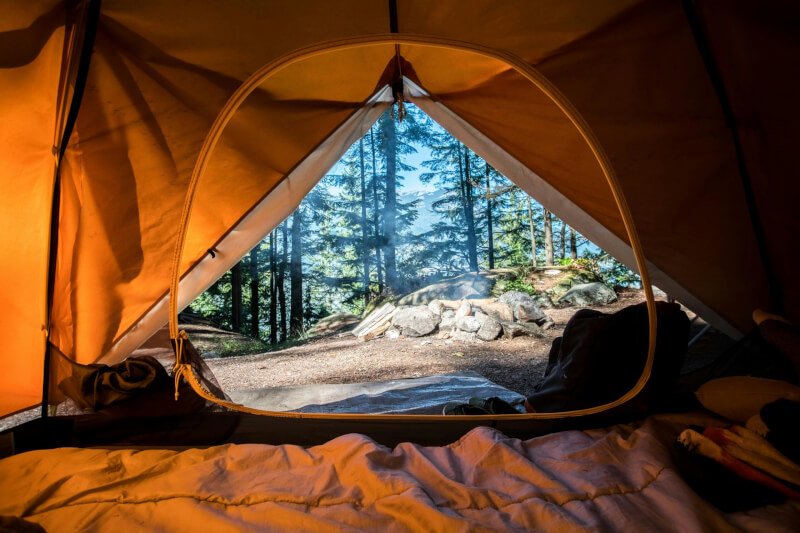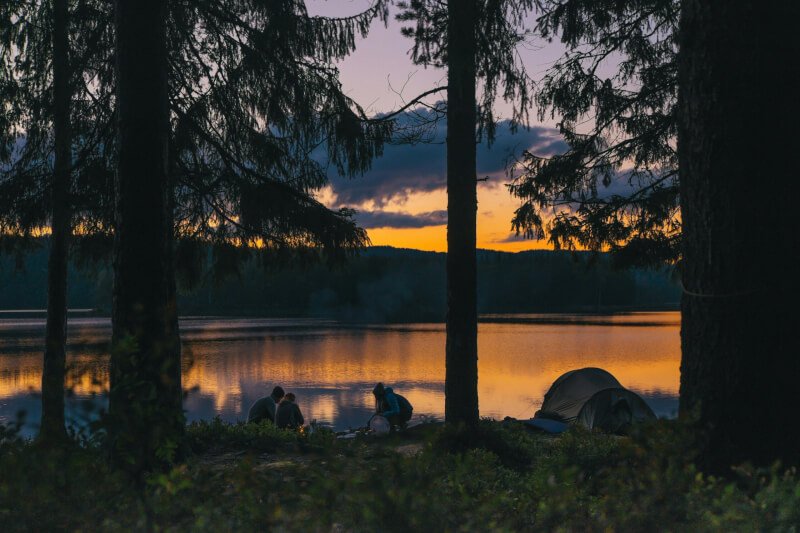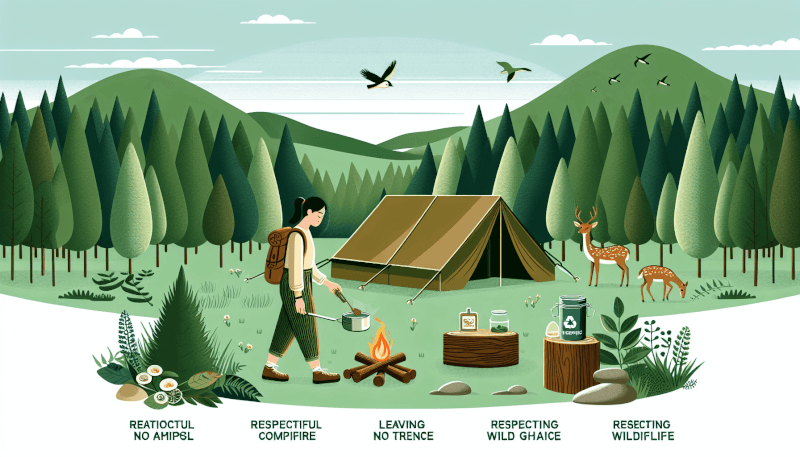On your camping adventure, it is crucial to prioritize the respectful and responsible appreciation of wildlife while leaving no trace behind. By understanding the importance of respecting the natural habitats and behaviors of animals, you can ensure a harmonious coexistence between humans and wildlife. This article provides valuable tips and guidelines to help you navigate your camping trip with utmost care, fostering a deep respect for the environment and leaving no negative impact on the delicate ecosystem. From proper food storage to observing animals from a safe distance, this article will equip you with the knowledge to make your camping adventure both enjoyable and environmentally sustainable.
Choose a Suitable Campsite
When embarking on a camping adventure, it is important to choose a suitable campsite that will not disrupt the delicate balance of the ecosystem. Consider camping in designated camping areas, as these are specifically designed to accommodate campers and minimize impact on the environment. These areas often have established campsites with amenities such as fire pits and restroom facilities.
It is crucial to avoid camping in sensitive habitats, such as wetlands or fragile vegetation. These areas provide essential habitats for various wildlife species, and disturbing them can have long-lasting detrimental effects. By selecting a campsite away from these sensitive areas, you can ensure that you are not interfering with the natural habitat.
Another important consideration when choosing a campsite is its proximity to water sources. It is recommended to camp at least 200 feet away from water sources, such as rivers, lakes, or streams. This distance helps to prevent water pollution and minimizes the risk of disturbing aquatic ecosystems. Additionally, keeping a safe distance from water sources ensures your safety from potential flash floods or rising tides.
Respecting private property and landowner rights is also crucial when selecting a campsite. Always ensure that you have permission to camp on private land and follow any specific guidelines or restrictions provided by the landowner. This shows respect for their property and helps to maintain positive relationships between campers and landowners.
Minimize Campfire Impact
Campfires are a quintessential part of the camping experience, but it is essential to minimize their impact on the environment. Before starting a campfire, always check local regulations and fire restrictions. These regulations are in place to prevent wildfires and protect both the environment and campers. Adhering to these regulations ensures a safe and environmentally responsible camping experience.
When possible, use existing fire rings or designated fire pits. These areas have already been impacted and offer a safe spot for a campfire without further damaging the surrounding environment. By utilizing these established fire areas, you help to reduce the spread of fire and minimize the impact on the landscape.
To minimize the environmental impact of your campfire, keep it small and manageable. A large fire can quickly get out of control and cause damage to the surrounding area. By keeping the fire small, you can also conserve firewood and reduce the amount of smoke produced.
Only burn local firewood that has been sourced from the area where you are camping. This reduces the risk of introducing invasive species or pests to the ecosystem. Transporting firewood from outside the area can unknowingly introduce harmful organisms that can have devastating effects on the local flora and fauna.
Before leaving your campsite, always ensure that the campfire is completely extinguished. This is done by dousing it with water and stirring the embers until they are cold to the touch. Never leave a campfire unattended or assume that it will go out on its own. Properly extinguishing the fire helps to prevent wildfires and protects the environment.

Dispose of Waste Properly
Proper waste disposal is essential to ensure a clean and healthy environment for both humans and wildlife. As a responsible camper, it is your responsibility to pack out all trash and litter. Leave no trace behind and transport all waste back with you to dispose of it properly.
When washing dishes at your campsite, use biodegradable soap. This type of soap breaks down naturally and does not harm the environment. It is important to avoid using regular soap, as the chemicals can pollute water sources and harm aquatic life. By using biodegradable soap, you minimize the impact on the environment while still maintaining hygiene standards.
Graywater, which refers to the water used for cooking, washing, and cleaning, should be disposed of properly. Do not pour graywater directly into water sources, as it can contaminate them. Instead, strain food particles, and disperse the graywater over a large area that is not close to water sources or campsites. This allows the water to slowly infiltrate the soil, minimizing its impact.
Human waste should be disposed of in catholes that are at least 6 inches deep. These holes should be dug at a safe distance from water sources, campsites, and trails. Ensure that the waste is properly covered with soil to prevent odor and to help promote decomposition. Proper disposal of human waste helps to prevent the spread of disease and minimizes the impact on the environment.
Respect Wildlife
When camping, it is important to respect and observe wildlife from a distance. While it may be tempting to get closer or interact with wild animals, it is crucial to remember that they are just that – wild. Approaching or feeding wild animals can disrupt their natural behavior and can be dangerous for both them and you.
Store food and scented items properly to prevent wildlife from being attracted to your campsite. Use bear-resistant containers or hang food in bear bags to keep it out of reach. This not only protects wildlife but also ensures your safety by minimizing the risk of encounters with large animals.
If you are camping with a dog, it is essential to keep it on a leash and under control at all times. This helps to prevent your dog from chasing or disturbing wildlife and protects both the animals and the natural ecosystem. Even the friendliest of dogs can unintentionally harm wildlife, so it is crucial to keep them on a leash and ensure they do not wander out of your campsite.

Leave What You Find
Respecting the natural environment means leaving it as you found it. When exploring the outdoors, do not disturb natural features or cultural artifacts. Whether it is a unique rock formation or an ancient petroglyph, these items contribute to the overall beauty and historical significance of the area. By leaving them untouched, you allow others to enjoy them for years to come.
Avoid picking flowers, removing rocks, or collecting natural items as souvenirs. While it may seem harmless to take a small stone or a pretty flower, these actions can have cumulative negative effects on the environment. By leaving these items in place, you help to preserve the natural beauty and biodiversity of the area.
Reduce Noise Pollution
Part of respecting both the environment and your fellow campers involves minimizing noise pollution. Keep noise levels low, especially during early morning and late evening hours when many people are seeking peace and quiet. Be mindful of the volume of your conversations, music, and any other activities that may generate noise.
Avoid using loud generators or playing loud music, as these can disrupt the natural tranquility of the camping area. While it may seem enjoyable to have music playing or to power electronic devices, it is important to prioritize the enjoyment and experience of the natural environment. Silence and the sounds of nature are often what draw people to camping in the first place.
Respect quiet hours in campgrounds, which are typically designated times during which noise should be kept to a minimum. These quiet hours are established to ensure that everyone can enjoy a peaceful camping experience, free from unwanted disruptions. By adhering to these guidelines, you contribute to the overall enjoyment of all campers in the area.

Stay on Designated Trails
When exploring the outdoors, it is important to stay on designated trails. Do not create new paths or take shortcuts through delicate vegetation. Trails are carefully designed to minimize the impact on the environment while allowing people to enjoy the beauty of nature. By staying on designated trails, you help to preserve the natural integrity of the area and protect sensitive habitats.
Always respect trail markers and signs. These provide important information, such as trail directions, safety warnings, and points of interest. Following these markers and signs ensures that you have a safe and enjoyable hiking experience while minimizing any negative impact on the environment.
Practice Leave No Trace Principles
Adhering to the principles of Leave No Trace is essential for responsible camping. This framework provides guidance on how to minimize your impact on the environment and ensure a sustainable camping experience.
Planning ahead and preparing is the first step in practicing Leave No Trace. This includes researching the area where you will be camping, understanding local regulations and permits, and packing the necessary supplies to minimize your impact. Proper planning sets the foundation for a successful and environmentally responsible camping trip.
When setting up your campsite, choose durable surfaces to travel and camp on. This means avoiding fragile vegetation, pristine meadows, or areas that are prone to erosion. By camping on durable surfaces such as established campsites or barren ground, you minimize damage to the ecosystem and protect sensitive habitats.
Minimize campsite alterations to the greatest extent possible. Avoid digging trenches, cutting branches, or otherwise modifying the natural landscape. The goal is to leave the campsite as you found it, allowing others to enjoy it in its natural state.
Leaving what you find is an important aspect of Leave No Trace. By refraining from disturbing natural features, cultural artifacts, or taking natural items as souvenirs, you contribute to the preservation and enjoyment of these resources for future generations.
Finally, be considerate of other visitors. Respect their space, privacy, and their opportunity to enjoy the natural environment. By being mindful of others and their experience, you promote a positive camping community and set an example for future campers.

Educate Yourself
To be a responsible camper, it is essential to educate yourself about the local wildlife and their habitats. Take the time to learn about the species you may encounter, their behaviors, and any specific guidelines for interacting with them. This knowledge allows you to observe and appreciate wildlife while minimizing any negative impact on their natural behavior.
Understanding Leave No Trace principles is crucial in practicing responsible camping. Familiarize yourself with the principles outlined in this article and strive to embody them in your camping practices. By understanding and implementing these principles, you can ensure that your camping adventures have a minimal impact on the environment.
Research camping regulations and permits in the areas you plan to visit. Each location may have specific guidelines or restrictions that are in place to protect the environment and ensure a positive camping experience for all. By knowing and following these regulations, you demonstrate respect for the local ecosystem and contribute to its preservation.
Lead by Example
As a responsible camper, you have the opportunity to lead by example and inspire others to adopt Leave No Trace principles. Teach your friends and family about responsible camping practices and the importance of preserving the environment. Share your experiences and knowledge to encourage others to follow in your footsteps.
Encourage your camping companions to adhere to Leave No Trace principles and practice responsible camping. By promoting these values within your immediate circle, you create a ripple effect that can reach a wider audience and contribute to a more sustainable and environmentally conscious camping community.
In conclusion, respecting wildlife and leaving no trace on your camping adventure is essential for the preservation of the environment and the enjoyment of future generations. By choosing a suitable campsite, minimizing campfire impact, disposing of waste properly, respecting wildlife, leaving what you find, reducing noise pollution, staying on designated trails, practicing Leave No Trace principles, educating yourself, and leading by example, you can ensure that your camping adventure is environmentally responsible and enjoyable for all. Happy camping!



